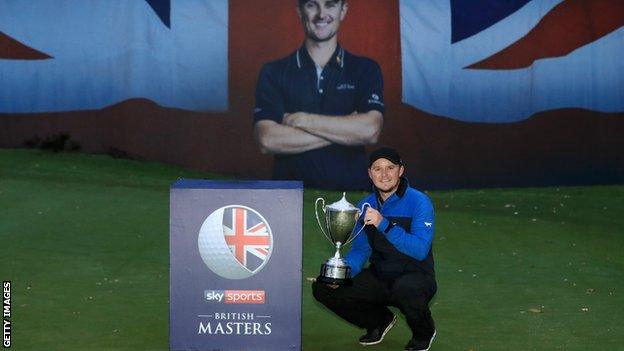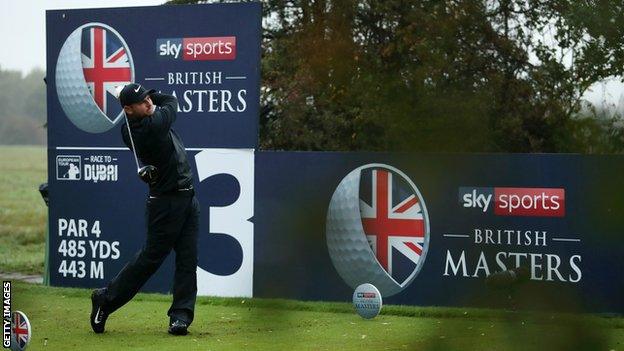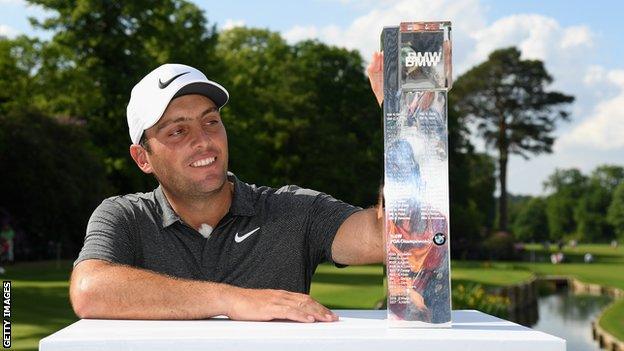British Masters a victim of the financial realities of the professional game
- Published
- comments

The expiration of Sky Sports' sponsorship contract, coupled with problems in attracting the top players, means 2018 British Masters winner Eddie Pepperell may not get the chance to defend his title next year
Despite the charismatic hosting of Justin Rose and a genuinely gutsy frontrunning victory by Eddie Pepperell, there was melancholy in the air at the British Masters. The tournament's future is very uncertain.
This is sad because it was a fine event staged on a great golf course at Walton Heath in the wake of a brilliant Ryder Cup.
As it stands, though, this historic event will not feature on next year's European Tour schedule.
Rose was its fourth English promoter, following Ian Poulter, Luke Donald and Lee Westwood, since it returned to the calendar in 2015.
They performed fantastic ambassadorial roles but the event seemingly has no future after the expiration of Sky Sports' sponsorship contract.
Last week showcased a generation of British talent spearheaded by the 27-year-old Pepperell. The Oxford man topped a leaderboard displaying the names of Jordan Smith, Matt Wallace, Sam Horsfield, Matt Fitzpatrick and Tom Lewis throughout the week.
UK golf and particularly the game in England is in rude health. The crowds were decent despite challenging weather and this should be a tournament with a great future.
But the facts of life in the professional game get in the way. While Rose bemoaned the demise of the British Masters, several of his elite contemporaries were elsewhere and the tournament was not as sexy as it might have been.
Of the UK players in Europe's triumphant Ryder Cup team, only Rose and Tommy Fleetwood turned up.
The lure of a £500,000 first prize was not enough for Rory McIlroy, Tyrrell Hatton, Poulter and Paul Casey - who finished 13th at the CIMB Classic on the PGA Tour in Kuala Lumpur instead.
And this was the first time in the four years since it returned to the schedule that Rose played.

Jordan Smith finished joint third at the British Masters and was part of a healthy contingent of UK players to feature in the top 10 during the tournament
Herein lies the problem. Elite players command appearance fees that can run into hundreds of thousands of pounds and they pick and choose tournaments accordingly.
They do what is best for them - not necessarily for the tour that gave them their start in the professional game. That is their right; they are that good. But it creates a vicious cycle. In their absence, securing backers for what could be fantastic tournaments is much more difficult.
"Sponsors want certainty," Giles Morgan, a director of the Institute of Sports Humanities and former head of sponsorship at HSBC, told BBC Sport.
"In order to get a good audience you need the right players. Golf's biggest threat is from other sports and it therefore needs to make sure it is secure within itself.
"Shoring up the UK market as a springboard for the European Tour is really important."
This requires the top players to buy into the bigger picture.
"They need to help their tour," Morgan said. "And the way they can help their tour is to play in the events which create a buzz around the game.
"And you would have thought that the British Masters, being in the UK near London on a great golf course would be one of those."

The BMW PGA, won by Francesco Molinari this year, will switch to September in 2019 to add to an already packed autumn schedule on the European Tour
The Tour is expected to announce its 2019 schedule next week. The calendar will take account of the shifting of the US PGA Championship from August to May.
The long-established Wentworth gathering for the BMW PGA moves to September, the same month as the women's Solheim Cup at Gleneagles.
Autumn becomes a key but crowded period and that presents more difficulties for the survival of the British Masters.
"The US is in a very strong place," Morgan pointed out. "It is effectively a continental tour with a lot of big cities with big fan populations. It is a less fractured media landscape and therefore as a sponsor in America you know what you are going to get.
"In Europe, it is much harder because it is a completely fractured media landscape because its made up of different countries."
Certainly the European Tour is fighting hard with its lucrative Rolex Series events, such as Wentworth as well as the Scottish, Irish and Italian Opens. Expect other established tournaments to be added to this elevated stratum.
But remember these bumper $7m prize funds tend to dramatically reduce how much might be shelled out on appearance fees, so the guaranteed sums the biggest stars expect are not available. And just like sponsors, the elite golfers like the certainty of a significant return.
"The top players exist on a different level to their peers," Morgan acknowledged. "This discrepancy causes an imbalance which creates uncertainty to investors.
"Ultimately, the business of golf has to put the fan first; they create the value. Fans create the volume, which attracts media and sponsors and therefore investment."
All of which means it is unlikely Pepperell will get the chance to defend the biggest and most significant title of his career. And that is a shame, not just for the player but for golf fans across the country.